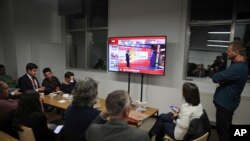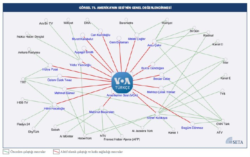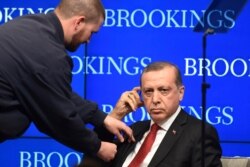A Turkish pro-government think tank, the Foundation for Political, Economic and Social Research or SETA, came under fire over the weekend after publishing a report profiling journalists working for foreign media organizations including Voice of America. Journalists associations and unions in Turkey have condemned the report.
The 202-page report, titled "The Off-shoots of International Media Organizations in Turkey," purports to analyze the political and economic coverage by the Turkish services of international news organizations including VOA, BBC, Deutsche Welle and the Russian media agency Sputnik. The report authors allege that their coverage is one-sided and unfair to the Turkish government.
SETA says the report drafted by a team of three researchers "aims to understand how Turkey is depicted in global arena as well as to identify the political circumstances around which the perception of those international media organizations is shaped."
The report has several sections, each dedicated to the targeted media organizations. At the outset of each section, the report provides some general information on the history of those media organizations and then dives into the specifics of their coverage regarding major breaking news such as the coup attempt in 2016 in Turkey, operations against PKK, Turkey's military incursion in Syria and the economic downturn in Turkey.
The report lists several journalists working for those media organizations based in Turkey as well as in their respective home countries. Their social media postings, the content of their stories and the level of their engagement on social media platforms are also included in the report.
The report also includes a chart that is referred to as a "network map" that shows other media organizations the journalists previously worked for. Based on the chart, the report alleges that most of those journalists worked for newspapers and TV stations critical of the Turkish government and thus are biased against the Turkish government.
"Blacklisting" condemned
The report has drawn criticism from a wide range of organizations in and out of Turkey. The report is widely seen as "blacklisting of journalists" working for international media organizations.
The Journalists' Union of Turkey Monday filed a criminal complaint against SETA, which is said to have close ties to the President Erdogan's ruling PKA party. Reporters Without Borders also issued a statement condemning the report saying "the report brought the harassment of foreign media reporters to a whole new level."
The report has widely been described as a "memorandum" in many Turkish news websites, referring to a time in Turkish political history when it was discovered that the Turkish military had drafted a report profiling journalists back in 1990s and early 2000s.
Some of the media organizations targeted in the report issued individual statements condemning the report. According to Deutsche Welle's website, a DW spokesperson said "The alleged work is meant to discredit foreign media which is still able to objectively and independently report on Turkey."
Murat Nişancıoğlu, the editor of BBC Turkish said "we do our work as journalists without being exposed to any political pressure under BBC editorial guidelines."
His statement regarding the report, posting on the BBC Turkish website, reads in part: "BBC is not for or against anybody. We do our stories in the right way and leave the commentary to the actors involved. It is clear that those who drafted the report were disturbed by that. What they want is pro-government reporting."
Turkish think tank defends the report
SETA Director İsmail Çaglar, who is also a columnist for the pro-government newspaper Takvim and who first tweeted the contents of the report back in April rejected criticism and defended the report in spite of strong reaction.
Caglar said "the entire content of the report has been compiled from open sources and most of the information on the profiles of journalists comes from their personal websites or resumes available on social media platforms such as LinkedIn.
"If there are mistakes, share with us. We will correct them and apologize. The rest is your ideological judgment and that's not our business" he tweeted.
The organization itself also posted a tweet defending the controversial report saying, "They have been upset by this report. They didn't like the fact that the Turkish offshoots of international media organizations respected in their own way have been taken hostage by marginal ideologies."
SETA Director Hasan Basri Yalcin said the organization is standing behind its report tweeting "Nobody has a right to describe a report based on open sources as memorandum or profiling. The question why the media industry in Turkey has recently been swollen and the effort to look into its structure is a quite legitimate one."
Turkey is ranked 157th in Reporters Without Borders Press Freedom Index among 180 countries. Since the coup attempt in 2016, thousands of people have been jailed including civil servants and military.
Currently, 135 journalists are serving time in Turkish jails.






